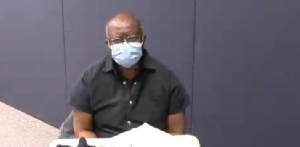“Revolution is about change, and the first place the change begins is in yourself (Assata Shakur)”
Why should the all-knowing gods and ancestors endow some with plenteous wisdom, intelligence, and prescience, others with diarrheic stupidity, dumbness, and cluelessness? Is it a slapstick comedy on the part of ontological transcendence, of otherworldliness? Are there all-knowing gods of intelligence, wisdom, and prescience, gods and ancestors of The Scarab Beetle, Patrice Lumumba, Harriet Tubman, Malcolm X, Marcus Garvey, Sojourner Truth, as opposed to all-knowing gods of stupidity, dumbness, and cluelessness, gods and ancestors of the sick “scholar,” Idi Amin, Francisco Nguema, Omar Bashir, Mobuto Sese Seko?
No one seems to know the answer for sure. It does, however, appear possibilities of binary opposition exist between the gods of poetic, journalistic, and novelistic creativity and the gods of poetic, journalistic, and novelistic stupidity, a view whose wide possibilities of existential actuation the powerful forces of transcendence are unwilling to unfreeze for public digestion.
This seeming mutual ideational exclusivity is indeed a verifiable reflection of the deep dichotomy The People correctly associate with The Country’s polarizing inter-ethnic socialization and ever-widening political intolerance. Is there a future for the shoddy poetry of intolerance? Is there a future for the yellow journalism of stupidity? Is there a future for the parboiled novelism of ethnocentrism? What about the natural science of creative poetization, journalism, and novelism? The gods and ancestors are not exactly saying. Not exactly answering. Obviously it is part of the uncolored mystery of transcendence. But who cares? The People certainly do. What have The People done as yet to neutralize the viable agency of the gods of stupidity, dumbness, and cluelessness? Cipher; zero. Does this not call for revolution, at least of the kind The Scarab Beetle, Harriet Tubman, Paulo Freire, Assata Shakur, Martin Luther King, Jr., Mother Teresa, Molefi Kete Asante, Camilo T. Restrepo, Nelson Mandela, and Malcolm X waged?
Evidently we are not calling for a revolution of arms, of terrorism, of cluster bombs! We are rather invoking the legitimacy of intellectual direction and moral revolution, noble abstractions of which the sick “scholar” and others of similar ideational bent are distantly identified with, for, apparently, it is one thing to come across as a fashionable category of conscious deceit, quite another to come across as a confused agent of moral dereliction. Even then, consistently living a lie is morally repulsive enough, not to talk of its potential to negate one’s personal dignity as well as to overturn the sovereignty of “truth.” Of course “truth” is itself not necessarily the audible absence of falsehood. Rather, “truth” is necessarily the audible absence of mutual neighborliness, of tolerance, of love, of mutual understanding flashed across the moral silhouette of internecine differences. Understandably this simple narrative is beyond the sick “scholar’s” and the Statue of Liberty’s grasp.
That possibly makes the sick “scholar” a lost cause predictably. Yet this seeming lost cause is inseparably enmeshed in the political psychology of The Country. In the meantime, the superimposition of minds, The Country’s and the sick “scholar’s,” is problematic for The Country’s progressive direction as The Scarab Beetle had conceived in line with the concept of philosophical consciencism. But the moral dynamics of this problematic designation is parallel to the graphic clumsiness of developmental retrogression The Country is apparently suffering from today. It is more like the awkward spatial gait of two antagonistic massive conjoined heads precariously dangling on a ghostly underfed torso. It may therefore seem a divorce between the sick “scholar’s” derailed psychology and The Country’s confused national psychology is urgently, even morally, called for. However, this contention poses the greatest moral challenge to The People’s fragmented psychology. Indeed any piece of mind that is not accommodative, progressively adaptable, or plastic is just as good as discarded in The Ignoramus Cage.
Clearly the sick “scholar” is not an apologist or exponent of logic, the instruments of critical thinking. This view is not debatable, however. Everybody knows this for a fact. The sick “scholar” himself knows this too, even his family including his deceased architects. Thus it is hugely disappointing for the pantheon of intelligence, wisdom, and prescience to distance themselves from mortal fallibility, from the mortality of man’s psychological finiteness. As it is already the mortality of the sick “scholar’s” psychological finiteness is as stiflingly constrictive as it is claustrophobically repugnant, since the graph theory of his stream of thought is replete with misplaced and disorganized nodes of critical thinking. This symptomatology, in principle, is typical of The Country’s politics as well. Yet these noble suites of gods and ancestors, the pantheon of intelligence and stupidity alike, are immanent impositions of otherworldliness, an acknowledgment that places human psychology in a controlling position, a location of authority as far as intimate interpretation of his environment goes.
It is as though The People should have to approach the sick “scholar’s” derailed psychology the same way Dr. Ben Carson approaches a mind of seizure with moral quanta of operational hemispherectomy, the same way Martin Luther King, Jr. approached a sick, seemingly reprobate society with moral rays of corrective embrace of his tormentors, perceived and real. Therefore, could good ethno-animal men and women of conscience flash a sense of narrative objectivity, critical thinking, and the scientific method across the unplastic synaptic clefts of the sick “scholar’s” asymmetric cranial morphology, restoring, as it does, sanity to an otherwise unbalanced psychology, O Great People of the World, for the sake of The People’s and The Country’s aggregate sanity? We certainly hope so, as others with good sense have already taken it upon themselves to effectuate. This should commensurately unburden The Country of the philosophical miasma of moral and intellectual indirection. But exactly how so? Let us see. The fiction, Achebe’s “imaginative literature,” thus speaks up in an auctorial guise of rhetorical otherness. Listen up:
“Ours is an excessively conscious age,” notes D.H. Lawrence in his essay “Making Pictures.” “We know so much, we feel so little.”
What kind of world was Lawrence referentially speaking of? It is a given the sick “scholar” is a mountainous heap of dysfunctional neurology. Yet The Country’s biggest “Atumpan,” an empty-barrel Talking Drum, the sick “scholar’s,” says confidently to D.H. Lawrence: “I know so little, I feel so big!” That sentential betrayal is reflective of the sick “scholar’s” depraved state of mind, the retrogressive antiworld of Lawrence’s progressive world! That, however, represents an enormous elephant of contradiction sapping the intellectual energy of The Country, The People, the national conscience, even the sick “scholar’s” own self-imposed funky stupidity, his funky dumbness...
“Mine is a conscious age of stupidity, something of my own making!” adds the sick “scholar.” Certainly, bearing a psychological library of information glut is not the same as being qualitatively well informed; after all, not every piece of information is qualitative. But the sick “scholar” misconstrues possession of information glut, worthless as they might be for the most part, as a reliable trope of intellectual resourcefulness. Therein lies a subterranean tomb of autogenic contradictions implicit in the public demeanor of the sick “scholar’s” intellectually sustained vainglory!
Question: How can an individual, supposedly enlightened, if we can allow that for the sake of argument, be so destructively set against himself, self-cannibalism? There should be an answer somewhere. How? It should, however, be argued that endless oppositional sliding of innate contradictions past each other within the narrative circumvention of personal privacy could, perhaps, constitute an internal psychological formula for implosive destructiveness. The sick “scholar’s” misbehavior is a perfect clinical exemplar. This is not merely a question of lazy speculation but one of critical pontification. Definitely, Obuoba J.A. Adofo’s “Ofie Nipa See Woa” and A.B. Crentsil’s “Anyen” and KRS-1’s “Self-Destruction” have much to say about such individuals whose oversight of their psychosocial environments includes opaque forests of self-destructive tendencies.
Self-hatred? Self-destruction? Inferiority complex? Ready exemplars being ethno-animal nation wreckers in The Country’s recent political history, individuals full of self-hatred! In fact, the psychosocial parameters of commonplace neocolonial confusion, self-hatred, and collective racial inferiority complex are still a mark of internecine national disunity.
Another Question: How can the insights of Kwame Botwe-Asamoah, Ama Mazama, Cheikh Anta Diop, Molefi Kete Asante, and Kofi Kissi Dompere successfully recover the sick “scholar’s” cranial barrenness from the flea market of intellectual trinketry? This is an extremely difficult, if not as impossible, task. It still is not untrue individual carriers of self-hatred have a group or communal dimension. Then the integral of communal idiosyncrasies, as of self-hatred, per se, have national and continental connotations. Alternatively phrased, therefore, geography defined in terms of geopolitics is merely a theoretical construct, meaning that the element of geography as a function of national consciousness is as emotionally fluid as it is intellectually plastic.
Look here: The sick “scholar’s” “I know so little, I feel so big” sentential smallness is a perfect candidate for the reductionist narrative of geographic inclusiveness, but his empty boastfulness is hostile to cosmopolitanism. That notwithstanding, a logical connotation therefrom points to progressive humanization of The Country’s variegated ethnicities within the topological space of collective existence. Unfortunately the element of self-hatred, personal or corporate, undermines the ring of mutual co-existence. However, putting those sentiments aside, let us ask: How could you “feel so big” when you “know so little”? Under what conditions can “little” be larger than “big”? Is it possible the sick “scholar’s” little tongue-splitting lies have become too large to fit into The People’s big oral cavity of truth? Or better still, how could the sick “scholar’s” mouth be bigger than his elephantine “Atumpan” head?
That is why The People and The Country cannot afford to allow the so-called “bystander effect” to fester around the central question of public socialization in the body politic, to take over affairs as the sick “scholar’s” innate psychology continues its deterioration beyond help, past the geostationary orbit of sanity. Accordingly, a convincing case could be made that because social individuation has never been a characterological fixture of The People’s national psychology since time immemorial, there is an urgent need to bring back the flesh and blood and soul of collective harmony back from the deadly world of neocolonialism to an emotional world of material actualities, though the sick “scholar” does not see the emotional dot of his mind as part of the rational constellation of the larger world of creative, productive intellectualism.
This decidedly requires a difficult tradeoff, one between self-hatred, ethnocentrism, and xenophobia on the one hand and mutual accommodativeness, tolerance, and respect on the other hand, much like the antagonistic polarities of electric charges finding a common ground of quantum acceptation across a plane of electromagnetic interaction.
This philosophical value system of polarizing electric socialization does not rule out creative possibilities of autogenic mutual repulsions taking place either within a separate field of positive electric charges or of negative electric charges. In other words, the fact that two separate individual families experience internal friction independent of one other is not enough reason to preclude simultaneous possibilities of interactive accommodativeness between them. That should underscore the moral aesthetics of community. However, the actualization of this social phenomenon of neutralizing the polarizing antagonisms of discommunity requires some degree of intellectual seriousness and moral honesty on the part of all progressive interacting variables in the equational cauldron of multiethnic socialization.
On the other hand, it is such a confused irony, a national disgrace, even, that the sick “scholar” can only be as distantly intellectually good as the stale, clownish histrionics of The Three Stooges, Bob Cole, Kohwe, Charlie Chaplain, Santo, Funny Face, Bob Okala, Nkomode, Lil Win, Richard Pryor, Agya Koo, Super OD, Mr. Bean, Waterproof…The fact of the matter is that the sick “scholar” has been allergic to intellectual seriousness ever since he came of age, having been also a philosophical negation of moral honesty. A Janus-faced sick “scholar” who always goes about the gravitational field of cactus intellectualism in drab masks of poetic, journalistic, and novelistic hypocrisies!
What say? A smattering of the sacred language of decency and decorum and respectability he lacks. The sick “scholar,” aside from all that, is more likely to engage in a case of encyclical journalism of insults than to serious actualities of applied knowledge or wisdom. However, as far as intelligent people are concerned, O Great People of the World, these critical questions are not ennobling virtues for him, the sick “scholar.” No wonder he is always smarting from the critical bites of more knowledgeable thinkers. These considerations boil down to unethical questions of vacuous boastfulness on the part of the sick “scholar” who is also, incidentally, among other things, dialectically out of sync with the modernizing compass of fruitful intellectualism.
How then do the supposed littoral facts of avian behaviorology answer to the aquatic mannerisms of ichthyologic actualities? In fact, those who do not intimately know him or about his anti-people socializing psychology have repeatedly failed to answer this question. It is even likelier the major reason lurking behind The People’s and The Country’s consistent tendency to stand in awe of his trinketry of scholarship lies with another major problematic, the question of why he did not take up a covetous specialty in the theatrics of comedy while pursuing his rusty anachronistic degrees in The Ignoramus Cave! Where are the imperatives of critique of his work? None. Besides, he has said time and again free speech and freedom of choice actually had driven him in that direction in pursuit of Monkey Literature for The Ignoramus, Orangutan Poetry for The Ill-bred, Bonobo Journalism for The Buffoon.
What is this mystery all about? Let us see. Since when did the people of The Country become reading monkeys, orangutans, and bonobos? What a contumely posture on the part of the sick “scholar”! What a national insult! Has the sick “scholar” finally come to a realization that his readership and The Country’s leadership are humanoid primates? Where is the sick “scholar” to answer this charge? Granted, is he, perchance, covertly sending signals to The People that the lackluster political performance of The Country’s leadership is ascribable to what he considers primatial intelligence? Is it possible for an ethno-animal man to write for primates in The Ignoramus Cage? Where is the sick “scholar” again to answer this question? Missing in action.
Do like charges attract each other? Possibly in the sick “scholar’s” antiworld. Let us look at the question from another angle: Given that the sick “scholar” is a primate himself, what makes him think he is more intelligent and more human than his primatial clade? The latter defines the national dilemma, a blurry overlap between primatial psychologization and humanoid pretensions.
We shall return…
Opinions of Saturday, 23 August 2014
Columnist: Kwarteng, Francis














